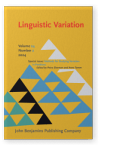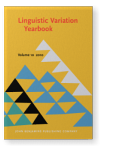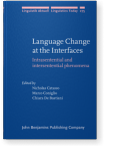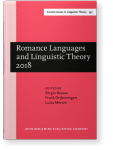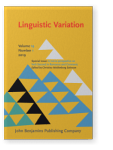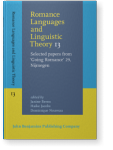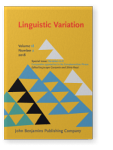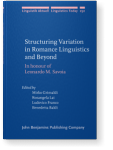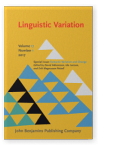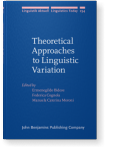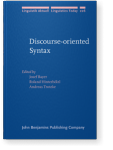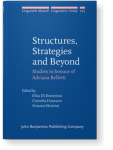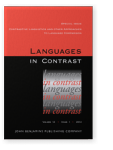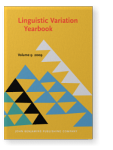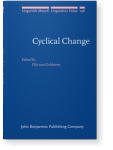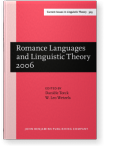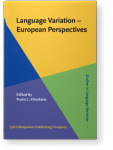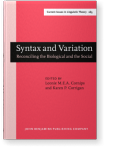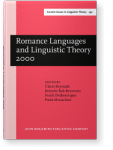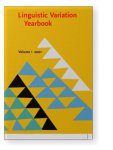Cecilia Poletto
List of John Benjamins publications for which Cecilia Poletto plays a role.
Journal
Yearbook
ISSN 1568-1483 | E-ISSN 1569-9900
2022 Bare quantifiers and Verb Second: The view from Old Italian Language Change at the Interfaces: Intrasentential and intersentential phenomena, Catasso, Nicholas, Marco Coniglio and Chiara De Bastiani (eds.), pp. 95–122 | Chapter
The pre-participial syntax of the bare quantifiers tutto ‘everything’, molto ‘much’ and niente ‘nothing’ in Old Italian has been argued to be determined by the optional or obligatory presence of a classifier-like category n° in their internal structures (Poletto 2014; Garzonio & Poletto 2017,… read more
2021 Chapter 13. Very …. extracted: On old Italian molto Romance Languages and Linguistic Theory 2018: Selected papers from 'Going Romance' 32, Utrecht, Baauw, Sergio, Frank Drijkoningen and Luisa Meroni (eds.), pp. 249–262 | Chapter
In this paper we consider cases of extraction of the degree word molto “very, much” from its modifier position within an AdjP (Giusti 2010a; b; Poletto 2014) in Old Italian. Such cases are reminiscent of Left Branch Extractions (LBE; Ross 1967), but, differently from what happens with adverb… read more
2019 More than one way out: On the factors influencing the loss of V to C movement A micro-perspective on Verb Second in Romance and Germanic, Meklenborg Salvesen, Christine (ed.), pp. 47–81 | Article
In this article I will show that there is not a single diachronic path that leads to the loss of the verb second property so that different languages can have different ways towards a non V2 grammar. I will also show that the progressive loss of subject inversion contexts is not the only factor… read more
2018 Additive and aspectual anche in Old Italian Romance Languages and Linguistic Theory 13: Selected papers from ‘Going Romance’ 29, Nijmegen, Berns, Janine, Haike Jacobs and Dominique Nouveau (eds.), pp. 127–142 | Chapter
In Modern Italian (MI), negative additives (e.g. neanche ‘neither/not even’) contain a negative morpheme ne - and obey negative concord (NC) with sentential negation. In Old Italian (OI), negative additives such as neanche are not attested. Instead, a non-negative additive, anche, combines with a… read more
2018 On relative complementizers and relative pronouns Variation in C: Comparative approaches to the Complementizer Phrase, Garzonio, Jacopo and Silvia Rossi (eds.), pp. 265–298 | Article
This paper explores the syntactic status of che and (il) qual(e) relativizers, i.e. what are standardly referred to as relative complementizers and relative pronouns, in Old and Modern Italian and Italian varieties and proposes a unified analysis for both types of items. It takes into account… read more
2018 Chapter 9. Negation patterns across dialects Structuring Variation in Romance Linguistics and Beyond: In honour of Leonardo M. Savoia, Grimaldi, Mirko, Rosangela Lai, Ludovico Franco and Benedetta Baldi (eds.), pp. 133–148 | Chapter
In this work we consider two opposite sorts of Romance varieties with respect to the negative marker, i.e. an Occitan variety where the preverbal negative marker alone is so much reduced that it can nowadays only occur in some specific syntactic contexts and two Venetan varieties where the… read more
2017 How bare are bare quantifiers? Some notes from diachronic and synchronic variation in Italian Syntactic Variation and Change, Håkansson, David, Ida Larsson and Erik Magnusson Petzell (eds.), pp. 44–67 | Article
In this article we analyze the internal structure of bare universal and negative quantifiers in Italian varieties, taking into consideration both synchronic and diachronic variation. It is proposed that bare quantifiers are not standard QPs with a null DP restrictor, but deficient items where… read more
2016 Which clues for which V2: A contribution to the typology of V2 on the basis of Old Italian Theoretical Approaches to Linguistic Variation, Bidese, Ermenegildo, Federica Cognola and Manuela Caterina Moroni (eds.), pp. 237–258 | Article
In this article I argue that the V2-like property of Old Italian is to be found in all phases, i.e. not only at the CP level, but also at the vP and DP left periphery. This means that a change of perspective is in order to account for the OV scrambling cases in the vP and for scrambling in the… read more
2015 On polarity particles in Italian varieties Discourse-oriented Syntax, Bayer, Josef, Roland Hinterhölzl and Andreas Trotzke (eds.), pp. 211–228 | Article
This article considers some constructions related with polarity emphasis in standard Italian and Italian dialects. In particular, the authors examine two constructions where the polarity particle is accompanied by a repetition of the whole propositional content of the stimulus assertion or question. read more
2015 Relative clauses in Cimbrian Structures, Strategies and Beyond: Studies in honour of Adriana Belletti, Di Domenico, Elisa, Cornelia Hamann and Simona Matteini (eds.), pp. 393–416 | Article
This paper provides an analysis of the left periphery of relative clauses in the Cimbrian variety of Luserna and explores which of the two complementizer systems Cimbrian makes use of in restrictive and appositive relative clauses. Furthermore, the sentential particle da (lit. ‘there’), which… read more
2012 Contrastive linguistics and micro-variation: The role of dialectology Contrastive Linguistics and other Approaches to Language Comparison, Hüning, Matthias and Barbara Schlücker (eds.), pp. 47–68 | Article
This article deals with a very general problem, namely the origin of the well-known distinction between dialectal and typological variation. It is argued that the fact that the possible grammatical choices are more restricted within a dialectal domain is not due to a supposed principled difference… read more
2011 Hidden verb second: The case of Cimbrian Studies on German-Language Islands, Putnam, Michael T. (ed.), pp. 301–346 | Article
The aim of the work is to provide some detailed insight into the mechanisms that regulate movement to the left periphery on the empirical basis of an up to now rather poorly investigated German variety, i.e. Cimbrian. We first show that Cimbrian still possesses the V2 property in the sense that the… read more
2009 Quantifiers as negative markers in Italian dialects Linguistic Variation Yearbook 2009, van Craenenbroeck, Jeroen (ed.), pp. 127–152 | Article
In this work we consider the diachronic development of two distinct types of negative markers, those originally stemming from minimizers (m-negation) and those originally deriving from a negative quantifier (q-negation). We provide evidence in favor of the hypothesis that, despite appearances,… read more
2009 Chapter 8. Two instances of a broken cycle: Sentential particles in Old Italian Cyclical Change, Gelderen, Elly van (ed.), pp. 185–208 | Article
2009 Another look at wh-questions in Romance: The case of Mendrisiottoand its consequences for the analysis of French wh-in situ and embedded interrogatives Romance Languages and Linguistic Theory 2006: Selected papers from ‘Going Romance’, Amsterdam, 7–9 December 2006, Torck, Danièle and W. Leo Wetzels (eds.), pp. 199–258 | Article
This article will attempt to show that there are at least two types of wh-doubling in
Romance. In some languages, such wh-doubling involves a complex DP of the form
[clitic wh-, wh-phrase], as in Illasi, Monno and the other North Eastern dialects of
Italy studied in Poletto and Pollock (2004),… read more
2005 The third dimension of person features Syntax and Variation: Reconciling the Biological and the Social, Cornips, Leonie and Karen P. Corrigan (eds.), pp. 265–299 | Article
2002 Complementizer Deletion in Florentine: The interaction between Merge and Move Romance Languages and Linguistic Theory 2000: Selected papers from ‘Going Romance’ 2000, Utrecht, 30 November–2 December, Beyssade, Claire, Reineke Bok-Bennema, Frank Drijkoningen and Paola Monachesi (eds.), pp. 57–76 | Article
2001 Eppur si muove!: On comparing French and Bellunese wh -movement Linguistic Variation Yearbook 2001, Pica, Pierre (ed.), pp. 147–180 | Article
This article offers a comparative syntax approach to wh-questions in French and Bellunese, a Northern Italian dialect spoken in the town of Belluno. A striking difference between the two languages, otherwise very closely related, lies in the fact that bare wh-words in root questions, which display… read more
